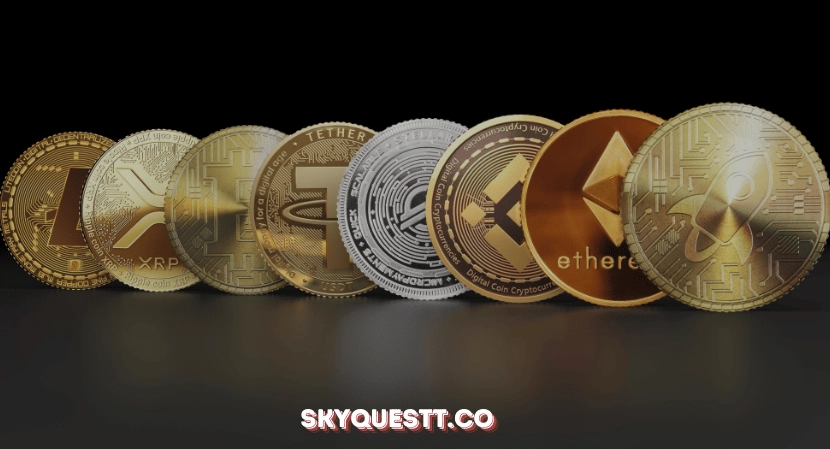
The cryptocurrency market has witnessed explosive growth over the past decade, drawing investors from all walks of life. With thousands of cryptocurrencies available, it can be overwhelming to determine which ones are worth investing in. In this detailed article, we will explore some of the best cryptocurrencies to consider for investment in 202. We will examine their potential, use cases, market positions, and the factors influencing their growth.
Top 5 Cryptocurrencies by Market Capitalization
1. Bitcoin (BTC)
Overview
Bitcoin (BTC) was created in 2009 by an anonymous individual or group known as Satoshi Nakamoto. As the first cryptocurrency, it has established itself as the leading digital asset, often referred to as “digital gold.” Bitcoin operates on a decentralized peer-to-peer network that allows for secure transactions without the need for intermediaries.
Why Invest?
- Market Dominance: Bitcoin remains the largest cryptocurrency by market capitalization, often accounting for over 40% of the total crypto market. This dominance reflects its status as a trusted store of value.
- Institutional Adoption: Major companies and financial institutions, such as Tesla, MicroStrategy, and Square, have started to accept and invest in Bitcoin, further legitimizing it as a mainstream asset.
- Limited Supply: With a maximum supply of 21 million coins, Bitcoin’s scarcity creates a unique value proposition, similar to precious metals like gold.
Investment Considerations
While Bitcoin is subject to price volatility, its long-term growth potential makes it a compelling investment choice. Investors should be prepared for fluctuations but can look to hold for the long term. Its established history and continued adoption trends provide a level of confidence in its future value.
2. Ethereum (ETH)
Overview
Ethereum (ETH) was launched in 2015 by Vitalik Buterin and a team of co-founders. It is the second-largest cryptocurrency by market cap and serves as a decentralized platform for building smart contracts and decentralized applications (dApps). Ethereum’s innovative technology allows developers to create complex applications without the need for a central authority.
Why Invest?
- Smart Contracts: Ethereum’s ability to execute smart contracts has revolutionized industries by automating processes and removing the need for intermediaries. This functionality has given rise to a robust ecosystem of decentralized finance (DeFi) applications and non-fungible tokens (NFTs).
- Ethereum 2.0: The transition to Ethereum 2.0, which includes the shift from Proof of Work (PoW) to Proof of Stake (PoS), aims to enhance scalability, security, and energy efficiency. This upgrade is expected to attract more users and developers to the platform.
- Strong Developer Community: Ethereum boasts one of the largest and most active developer communities in the blockchain space, ensuring continuous innovation and improvement.
Investment Considerations
Ethereum’s versatility and ongoing improvements position it as a compelling investment. However, potential investors should be aware of the increasing competition from other smart contract platforms like Binance Smart Chain, Solana, and Cardano, which may affect Ethereum’s market share.
3. Binance Coin (BNB)
Overview
Binance Coin (BNB) is the native cryptocurrency of the Binance exchange, one of the largest and most popular cryptocurrency exchanges globally. Initially launched as a utility token for transaction fee discounts, BNB has evolved into a versatile asset used across various applications within the Binance ecosystem.
Why Invest?
- Utility and Demand: BNB is utilized for trading fee discounts on Binance and serves various functions in the Binance Smart Chain (BSC), including staking and participating in token sales.
- Burn Mechanism: Binance regularly conducts token burns to reduce the total supply of BNB, creating upward pressure on the price as demand increases.
- Growing Ecosystem: The rapid growth of Binance and its services, including DeFi projects and NFT marketplaces, enhances the utility and demand for BNB.
Investment Considerations
BNB’s connection to Binance provides a strong foundation for its value, but potential investors should monitor regulatory developments affecting the exchange. Increased scrutiny from regulators could impact Binance’s operations and, in turn, the price of BNB.
4. Cardano (ADA)
Overview
Cardano (ADA) is a blockchain platform founded by Ethereum co-founder Charles Hoskinson. Launched in 2017, Cardano aims to provide a more secure and scalable platform for dApps and smart contracts through a research-driven approach that prioritizes academic rigor and peer-reviewed development.
Why Invest?
- Layered Architecture: Cardano’s unique architecture separates the settlement layer from the computation layer, enhancing security and scalability, making it an attractive option for developers.
- Focus on Sustainability: Utilizing a Proof of Stake consensus mechanism, Cardano is more energy-efficient compared to traditional mining operations, appealing to environmentally conscious investors.
- Strategic Partnerships: Cardano has formed partnerships with various governments and organizations to implement blockchain solutions, positioning itself for increased adoption in emerging markets.
Investment Considerations
Cardano’s ambitious goals and strong technology make it an appealing investment option. However, investors should keep an eye on the platform’s ability to deliver on its promises and compete with other smart contract platforms, as success will depend on real-world use cases and adoption.
5. Solana (SOL)
Overview
Solana (SOL) is a high-performance blockchain designed for decentralized applications and crypto projects. Launched in 2020, Solana has gained popularity for its exceptional transaction speeds and low fees, making it a strong competitor in the blockchain space.
Why Invest?
- Scalability: Solana can process thousands of transactions per second, allowing it to compete effectively with traditional financial systems and other blockchain networks.
- Expanding Ecosystem: The Solana ecosystem is rapidly growing, with numerous dApps, DeFi platforms, and NFT projects being developed, attracting both developers and users.
- Institutional Interest: Solana has gained attention from institutional investors and venture capital firms, adding credibility to its long-term prospects.
Investment Considerations
While Solana’s rapid growth and technological advantages are promising, its relatively short history means it carries higher risk. Investors should conduct thorough research and stay updated on developments within the Solana ecosystem to understand its future potential.
Investing in cryptocurrencies can be both rewarding and risky, making it crucial for investors to conduct thorough research and stay informed about market trends. Bitcoin and Ethereum continue to lead the pack, while Binance Coin, Cardano, and Solana offer exciting opportunities in emerging areas of the cryptocurrency space.
Key Takeaways
- Diversification: Consider diversifying your investments across different cryptocurrencies to mitigate risk and enhance potential returns.
- Long-Term Perspective: Focus on the long-term potential of the projects rather than short-term price movements, as this approach often leads to better investment outcomes.
- Stay Informed: Regularly keep abreast of developments in the cryptocurrency market, including regulatory changes, technological advancements, and market trends that could impact your investments.
Final Thoughts
By investing wisely and keeping a close eye on the evolving landscape of cryptocurrencies, you can take advantage of the significant opportunities presented by the market in 2024 and beyond. As always, investing in cryptocurrencies requires a careful assessment of your risk tolerance and financial goals. Whether you’re new to crypto or a seasoned investor, understanding the potential of these top cryptocurrencies can help you make informed decisions and enhance your investment strategy.



